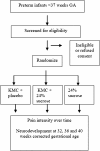Trial of repeated analgesia with Kangaroo Mother Care (TRAKC Trial)
- PMID: 24284002
- PMCID: PMC3828622
- DOI: 10.1186/1471-2431-13-182
Trial of repeated analgesia with Kangaroo Mother Care (TRAKC Trial)
Abstract
Background: Skin-to-skin contact (SSC) between mother and infant, commonly referred to as Kangaroo Mother Care (KMC), is recommended as an intervention for procedural pain. Evidence demonstrates its consistent efficacy in reducing pain for a single painful procedure. The purpose of this study is to examine the sustained efficacy of KMC, provided during all routine painful procedures for the duration of Neonatal Intensive Care Unit (NICU) hospitalization, in diminishing behavioral pain response in preterm neonates. The efficacy of KMC alone will be compared to standard care of 24% oral sucrose, as well as the combination of KMC and 24% oral sucrose.
Methods/design: Infants admitted to the NICU who are less than 36 6/7 weeks gestational age (according to early ultrasound), that are stable enough to be held in KMC, will be considered eligible (N = 258). Using a single-blinded randomized parallel group design, participants will be assigned to one of three possible interventions: 1) KMC, 2) combined KMC and sucrose, and 3) sucrose alone, when they undergo any routine painful procedure (heel lance, venipuncture, intravenous, oro/nasogastric insertion). The primary outcome is infant's pain intensity, which will be assessed using the Premature Infant Pain Profile (PIPP). The secondary outcome will be maturity of neurobehavioral functioning, as measured by the Neurobehavioral Assessment of the Preterm Infant (NAPI). Gestational age, cumulative exposure to KMC provided during non-pain contexts, and maternal cortisol levels will be considered in the analysis. Clinical feasibility will be accounted for from nurse and maternal questionnaires.
Discussion: This will be the first study to examine the repeated use of KMC for managing procedural pain in preterm neonates. It is also the first to compare KMC to sucrose, or the interventions in combination, across time. Based on the theoretical framework of the brain opioid theory of attachment, it is expected that KMC will be a preferred standard of care. However, current pain management guidelines are based on minimal data on repeated use of either intervention. Therefore, regardless of the outcomes of this study, results will have important implications for guidelines and practices related to management of procedural pain in preterm infants.
Trial registration: ClinicalTrials.gov Identifier: NCT01561547.
References
-
- Batton DG, Barrington KJ, Wallman C. Prevention and management of pain in the neonate: an update. Pediatrics. 2006;118(5):2231–2241. - PubMed
-
- Johnston C, Campbell-Yeo M, Fernandes A. Kangaroo mother care for procedural pain in pre-term infants. US Pediatrics. 2008;4(2):80–82.
-
- Johnston C, Campbell-Yeo M, Fernandes A, Inglis D, Streiner D, Zee R. Skin-to-skin care for procedural pain in neonates. Cochrane Database of Syst Rev. 2010;3 CD008435. - PubMed
-
- Stevens B, Yamada J, Lee GY, Ohlsson A. Sucrose for analgesia in newborn infants undergoing painful procedures. Cochrane Database Syst Rev. 2013;1 CD001069. - PubMed
Publication types
MeSH terms
Substances
Associated data
Grants and funding
LinkOut - more resources
Full Text Sources
Other Literature Sources
Medical


